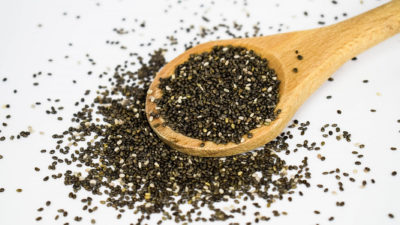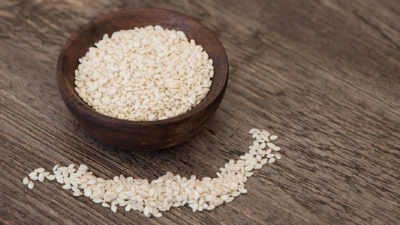Nuts

Why eating a variety is the best strategy for good health
Nuts are fruits with a hard outer shell and an oily seed inside. They typically grow on trees but there are exceptions, such as peanuts – these are really pulses and grow underground but are grouped with nuts because they are nutritionally similar. Most nuts are good sources of healthy fats, protein, fibre, antioxidants and usually contain vitamin E and B group vitamins. On top of that they are rich in minerals but that’s where they tend to vary quite a lot.
Almonds
Almonds are particularly rich in vitamin B2 (riboflavin) which we need for energy metabolism, tissue repair and growth, healthy eyesight and red blood cell production. They offer respectable amounts of vitamin E, with one ounce covering more than a half of your daily needs and over 10 per cent (75 mg) of your daily calcium requirement. That’s why almonds are considered a good calcium source. An ounce of almonds supplies about a quarter of your recommended daily magnesium dose, essential for nerve and muscle function, a healthy immune system, steady heartbeat and strong bones.
Almond summary: great for calcium, magnesium, vitamins E and B2
Cashews
Cashews offer small amounts of vitamin E and B group vitamins and a large dose of vitamin K – one ounce covering about 12 per cent of your daily needs. Vitamin K is important for healthy blood clotting and strong bones.
When it comes to minerals, cashews are a good source of iron, zinc and magnesium. One ounce contains almost two milligrams of iron and considering that the recommended daily dose of iron for women under the age of 50 is 14.8 milligrams and 8.7 milligrams for everyone else, cashews are a rich source. That same one ounce of cashews also provides up to a quarter of your recommended daily zinc dose, essential for a healthy immune system, skin and eyesight.
Cashew summary: excellent for iron, zinc, magnesium and vitamin K
Brazil nuts
Brazil nuts are an exceptionally rich source of selenium, a mineral needed for a healthy immune system, thyroid function and reproduction. Just one Brazil nut provides your recommended daily dose of selenium. On the other hand, eating too many Brazil nuts may supply too much selenium, which is toxic in high amounts. So, adding a few to your daily snack is a healthy habit but don’t eat a whole pack.
Brazil nuts are also a good source of magnesium, important for nerve and muscle function, and copper, which is essential for red blood cell formation, collagen manufacture and many vital reactions in the body.
Brazil nut summary: outstanding source of selenium
Pecans
Pecans are delicious but, perhaps surprisingly, they aren’t a rich source of many essential nutrients. The only exception is manganese, which is a mineral we need for healthy bones, skin, cartilage, nervous system and in sugar metabolism. It also plays a key role in protecting our cells and tissues from damage and keeping the immune system strong.
Some people think pecans are a good source of vitamin E but while they do contain some, it’s not very much.
Pecan summary: rich source of manganese
Hazelnuts
Hazelnuts are a good source of folate, essential for brain and nerve function, and vitamin E. The latter is an important antioxidant that protects cell membranes from damage. You may have noticed that many skin care products contain vitamin E but it’s far better to feed your skin from the inside.
Hazelnuts are rich in manganese and copper and contribute to your iron intake, with around 1.3 milligrams per ounce.
Hazelnut summary: good source of folate, vitamin E, manganese, copper and iron
Walnuts
The good old walnut offers a range of nutrients but in smaller amounts – several B group vitamins, calcium, magnesium, iron and zinc. What makes them stand out among other nuts is their high polyunsaturated fat content. They are a rich source of the essential omega-6 and omega-3 polyunsaturated fats and, as a bonus, they contain them in the right ratio for the human body to use well. Just one ounce (a small handful) covers your daily omega-3 needs. These fats are vital for your brain, cell membranes, hormone formation and they are also anti-inflammatory so having a reliable daily intake is important for good health.
Walnut summary: excellent source of omega-3 fats
Peanuts
Not true nuts but pulses, peanuts are all time favourites, not just because they are cheap and tasty but because they are also high in protein – one ounce supplies over seven grams. They are also a good source of vitamin E and folate and contribute modest amounts of iron, magnesium, copper, manganese and zinc. A quality peanut butter offers all the same benefits.
Peanut summary: good source of protein, vitamin E and folate
Pistachios
Their green colour gives away one group of pistachio nutrients – they are rich in antioxidants that protect our tissues from damage and may help prevent cancer. Two of these antiooxidants, lutein and zeaxanthin, are also important in protecting eye health.
Another nutrient pistachios offer is vitamin B6 (pyridoxine), which is vital for healthy nervous and cardiovascular systems and energy metabolism. They also contain small amounts of other important minerals, such as calcium, iron, manganese, potassium, selenium and zinc.
Pistachio summary: rich in antioxidants and vitamin B6
In a nutshell
Nuts should be a part of our daily menu and it’s best to eat a variety to obtain the full range of minerals they provide. Unsalted are always healthier, especially if you are prone to high blood pressure. Roasting may degrade the healthy fats in nuts so eating unroasted nuts is preferable, however, if you really do prefer the roasted taste, mix roasted with unroasted nuts for a healthy compromise.
Daily nut consumption is not just a heathy and delicious habit, it may also help prevent heart disease and, thanks to the fibre nuts deliver, it supports your good gut bacteria. A handful of nuts may just be the ultimate healthy snack.






